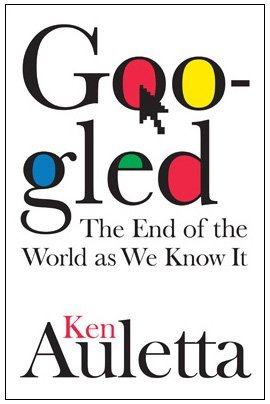 Midway through Ken Auletta’s Googled: The End of the World As We Know It, I found myself fascinated reading about a meeting at the eponymous company. Now, I’m not big on participating in meetings, much less reading about them. But this meeting was different.
Midway through Ken Auletta’s Googled: The End of the World As We Know It, I found myself fascinated reading about a meeting at the eponymous company. Now, I’m not big on participating in meetings, much less reading about them. But this meeting was different.
Company co-founders Larry Page and Sergey Brin were becoming increasingly frustrated with the tenor of a meeting with engineering VP Sridhar Ramaswamy about the latter’s proposed recommendations to improve AdWords. Google’s first incarnation of AdWords (version 1.0, launched in 2002) provided enormous revenue but many parts of the program had remained clunky–by Google’s lofty standards at least. Auletta writes:
“I named this 3.0 for a reason,” Page interjected. “We wanted something big. Instead, you (Ramaswamy) proposed something small. Why are you so resistant?”
Ultimately, Page and Brin push Ramaswamy and his team to overcome their hesitations to radically upgrading AdWords, forcing them to be as bold as possible. You see, at Google, marginal improvements are not acceptable. In a phrase, that sums up Google–the company and the culture.
Fundamental Questions about Where We are Headed
Is there overlap here with other books, such as Planet Google? Of course. How can there not be? However, if there’s one thing that distinguishes the two books, it’s that Auletta is not merely content to tell the obligatory tale about how two grad students at Stanford met and ultimately redefined search. No, Auletta’s excellent book is as much about the company as it as about content in the Internet age and the fundamental questions that Google is making us ask, such as:
- Are Google’s efforts to digitize books, television, and music ultimately good for society?
- What is Google’s role in the decline of newspapers and “proper” journalism?
- Should Google buy The New York Times?
- By making so many things essentially free, is Google disintermediating too much?
- Is Google naive? Or has Google become the new “evil empire”, despite its corporate credo to never be evil?
- Can “old media” compete with Google properties such as YouTube and Google News?
Auletta’s eleven week-long trips to Google and access to key current and former employees pays enormous dividends. Even elusive insiders such as Bill “The Coach” Campbell chime in with their thoughts about very sensitive internal matters.
Simon Says
Ultimately, Googled is not just about Google. Consider the book’s apropos subtitle. It’s a profound book about an amazing company but also about its enormous implications for the present and future. In this sense, Googled is redolent of Chris Anderson’s two books–Free and The Long Tail.
If you’re merely looking for a short, simple story of how Google became so big, then you might want to pass on Googled. If you’re up for a book that challenges core assumptions held by so many and asks troubling questions about all things digital, then dive in. You won’t be disappointed. I promise.
 PHIL SIMON
PHIL SIMON


I saw Auletta on Charlie Rose, and having read other books on Google (Battelle’s book, The search, was quite good) much of what he said I’d heard, seen or read before.
The big question, the question that echoes back to Microsoft, is how much power any company should be allowed to have.
In Microsoft’s case this was easier, as it was a company that many hated already, or had gripes about its products earning how much they’d paid for them. The public largely was happy to see people questioning and challenging Microsoft’s power.
But Google is an enormously popular company. Most of their products are free. Their brand status is still very high.
But the core question, at what point, even for, lets say, a benevolent company, does their degree of control over any market or technology work against the long term interests of everyone involved?
In the book, does Auletta explore the privacy issue? This another dimension that makes fears about Googles dominance more complex than others.
Thanks for the comment, Scott.
I wonder if this is the interview that you mentioned:
https://www.charlierose.com/view/interview/8903#comment_72258
I’d say that Planet Google (another book that I read and reviewed recently) probably deals a bit more with privacy. You also hit the nail on the head with the comparison to Microsoft, something about which you obviously know a great deal.
I agree that it’s really difficult to hate a company that gives away most of its products, although some of its competitors–as you know–feel quite differently.